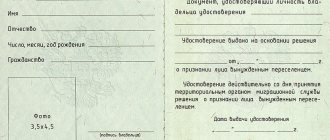Every citizen sooner or later has to participate in public relations, where one of the parties is the state or its representatives (state bodies). In this, as in any other relationship, both parties must inevitably have mutual rights and obligations to each other. The complex of these rights and obligations determines the administrative and legal status of citizens of the Russian Federation. It must be reflected in domestic legislation and is the most important part of the general legal status of a Russian citizen. Let's take a closer look at it.
Russian citizenship: what is it and how to get it
First, let’s define what Russian citizenship is. It is a stable political and legal connection between the Russian Federation itself and its citizens, expressed in mutual rights, duties and responsibilities. Due to this connection, for its part, the state undertakes to control the implementation of the rights and freedoms of the individual on its territory, for which everyone undertakes to comply with internal Russian legislation and other regulations. In turn, a citizen of the Russian Federation can claim patronage and protection from the Russian state, no matter where he is at the moment.
There are several reasons why a person can become a citizen:
- from Russians or on Russian territory;
- as a result of permanent residence in the Russian Federation and;
- as a result of former citizens;
- due to an option or transfer related to changes in state borders.
The scope of rights and responsibilities of Russians is always the same, regardless of the method of acquiring citizenship.
Administrative and legal status
Administrative legal status, as already mentioned, is the most important part of the general legal status of a citizen. But unlike the latter, the first is designed to specify and systematize the range of rights and responsibilities that citizens are endowed with in the sphere of executive power and public administration. When considering it in this context, one must keep in mind that the administrative-legal status is primarily determined by the rules of law, which means that the legal position of an individual in society and his relationship with the state depends on the perfection of legislation in the field of public administration.
Thus, the administrative-legal status of a person and a citizen of the Russian Federation is a range of rights and obligations of an individual, as well as guarantees of their implementation and responsibility for non-fulfillment in the field of public administration, enshrined in Russian administrative legislation.
However, due to the imperfection of the legislation, we can state that full regulation of administrative status takes place only in terms of the administrative responsibility of citizens (in particular, in the Administrative Code).
As for administrative legal capacity, its legal regulation is far from perfect, since its features, in particular, consist in the fact that the legislator often connects the rights and obligations of citizens with their position in society or some special status of a participant in relations in the field of management (for example , separately for candidates for civil service, for applicants, for vehicle drivers, and so on). At the same time, the legislation itself in this area lacks a single center (for example, a full-fledged Administrative Code) and is fragmented by industry and relationships with individual bodies, whose activities are regulated by dozens, if not hundreds, of normative legal acts generating rights and obligations.
Because of this, the concept and content of administrative-legal status is often considered as a set of fragments of the rights and responsibilities of individuals in their individual relations, for example, with health care, education, judicial authorities, and so on. By the way, based on this criterion, several types of statuses can be distinguished.
Types of statuses
Based on the composition of the subjects that are subject to certain legal acts that give rise to rights and obligations in the field of administrative management, the following types of administrative and legal status of citizens can be distinguished:
- general - a provision that, due to its enshrinement in fundamental legal acts (for example, the Constitution), applies to all citizens without exception;
- special - a provision that applies to certain categories of citizens (for example, military personnel, drivers, healthcare workers, pensioners, disabled people, and so on);
- individual – the position of an individual citizen, taking into account his individual characteristics, such as age, legal capacity, marital status, and so on.
Administrative and legal status of a citizen of the Russian Federation.
Administrative law.
| 1. | Administrative legal status of citizens of the Russian Federation. |
| 2. | Administrative expulsion from the Russian Federation of a foreign citizen and stateless person. |
| 3. | Administrative law as a science: concept, subject, methodology. |
| 4. | Administrative and legal status of foreign citizens and stateless persons. |
| 5. | Administrative and legal status of executive authorities. |
| 6. | Administrative and legal status of enterprises and institutions. |
| 7. | Types of administrative penalties. |
| 8. | Statement as one of the types of citizens' appeals, its concept and content. |
| 9. | Qualification requirements for applicants to the civil service. |
| 10. | Classification of administrative and legal acts of management. |
| 11. | Classification of administrative-legal relations. |
| 12. | Classification of executive authorities. |
| 13. | Code of the Russian Federation on Administrative Offenses: structure and legal novelty. |
| 14. | The range of persons against whom administrative punishment may be applied. |
| 15. | Deprivation of special rights as a type of administrative punishment. |
| 16. | The place of the science of administrative law in the system of legal sciences. |
| 17. | Imposition of administrative punishment for the commission of several administrative offenses. |
| 18. | Circumstances excluding administrative liability. |
| 19. | General and special legal personality of citizens of the Russian Federation. |
| 20. | Public associations: rights, obligations, guarantees, liability. |
| 21. | General rules for imposing administrative penalties. |
| 22. | Definition of public office. Categories of government positions. |
| 23. | Executive authorities of the constituent entities of the Russian Federation. |
| 24. | Local government bodies as subjects of administrative law. |
| 25. | Responsibility of civil servants. |
| 26. | The difference between administrative liability and other types of legal liability. |
| 27. | Plenipotentiary representatives of the President of the Russian Federation in federal districts, the basis of their administrative and procedural status. |
| 28. | The concept of administrative supervision. Bodies exercising administrative supervision. |
| 29. | The concept and main features of the executive authority. |
| 30. | The concept and main features of administrative responsibility. |
| 31. | The concept and features of administrative legal norms. |
| 32. | Concept and principles of public service. |
| 33. | Concept and content of administrative-legal regimes. |
| 34. | The concept of control in public administration. |
| 35. | Concept, main features of an administrative-legal act of management. |
| 36. | Concept, main features of executive power. |
| 37. | Concept, subject, method and system of administrative law as a branch of law. |
| 38. | Concept, signs of an administrative offense. |
| 39. | Concept, goals of administrative punishment. |
| 40. | Concept, goals and types of disciplinary sanctions. |
| 41. | The procedure for passing public service. |
| 42. | Warning as a type of administrative punishment. |
| 43. | Procedure for adoption of normative acts. |
| 44. | Differences between substantive and procedural administrative legal norms. |
| 45. | The ratio of basic and additional types of administrative penalties. |
| 46. | Composition of an administrative offense. |
| 47. | Statute of limitations for bringing to administrative liability. |
| 48. | Subjects with special administrative and legal status. |
| 49. | Forms of implementation of administrative legal norms. |
| 50. | Functions of administrative law as a science. |
| 51. | Characteristics of the structure of administrative legal norms. |
| 52. | Legal basis for building relationships between federal executive authorities and the relevant bodies of the constituent entities of Russia. |
Administrative and legal status of a citizen of the Russian Federation.
The administrative-legal status of a citizen is a set of rights, duties and responsibilities implemented in the sphere of public administration and regulated by administrative-legal norms.
Structure of administrative and legal status:
– administrative legal capacity – the ability to be a subject of administrative law, have rights and perform duties of an administrative legal nature;
– administrative capacity – the ability of a person, through his personal actions, to acquire subjective rights and perform duties, as well as bear responsibility in accordance with the norms of an administrative legal nature;
– a set of rights and obligations;
- responsibility;
– guarantees of realization of rights and obligations. Types of administrative and legal status depending on the status of the subject:
– administrative and legal status of the individual;
– administrative and legal status of a citizen;
– administrative and legal status of a foreign citizen;
– administrative and legal status of a stateless person.
Types of administrative and legal status depending on the subject:
– general administrative and legal status – a status that belongs to any person regardless of gender, age, education and other characteristics;
– special – status belonging to certain categories of citizens (for example, civil servants, military personnel, etc.);
– special – status that belongs only to certain categories of citizens (for example, guardians, trustees).
Categories of citizens: ordinary, dual citizenship.
Ordinary citizens are divided into: 1. persons who have Russian citizenship on the day the Federal Law “On Citizenship” of 2002 came into force. 2. persons who acquired Russian citizenship in accordance with the Federal Law “On Citizenship”.
Principles of citizenship of the Russian Federation: 1. Citizenship is uniform and equal, regardless of the grounds for its acquisition. 2.staying outside the Russian Federation does not terminate Russian citizenship. 3. A citizen of the Russian Federation cannot be deprived of citizenship or the right to change it. 4. A citizen cannot be expelled from a foreign country. 5.rf encourages the acquisition of citizenship by persons living in the territory of the Russian Federation if they do not have citizenship. 6. the conclusion or dissolution of a marriage between a citizen of the Russian Federation and a person who does not have Russian citizenship does not entail a change in their citizenship.
Acquisition of citizenship: 1.by birth, 2.as a result of admission to Russian citizenship. 3. as a result of restoration of citizenship. 4.on other grounds provided by law.
Termination of citizenship: 1. in case of renunciation of Russian citizenship. 2. on other grounds provided for by law.
Administrative expulsion from the Russian Federation of a foreign citizen and stateless person.
Administrative expulsion is the forced and controlled movement of specified citizens and persons across the state border of the Russian Federation or their controlled independent departure from the Russian Federation;
Administrative expulsion from the Russian Federation of foreign citizens or stateless persons consists of the forced and controlled movement of these citizens and persons across the State Border of the Russian Federation outside the Russian Federation, and in cases provided for by the legislation of the Russian Federation - in the controlled independent departure of foreign citizens and persons stateless from the Russian Federation.
Classification of administrative and legal acts of management.
A legal act of management is a type of legal act, a unilateral legal expression of the will of government bodies and officials based on the law, adopted in the established procedural order and aimed at establishing administrative-legal or the emergence, change and termination of administrative-legal relations.
Signs: has a legal form; published by an authorized entity; is of a legally authoritative nature; serves as a legal fact; may be appealed; provided by the power of state coercion.
The range of persons against whom administrative punishment may be applied
The concept of administrative supervision - she crossed out this question.
Legal basis for building relationships between federal executive authorities and the relevant bodies of the constituent entities of the Russian Federation.
Administrative law.
| 1. | Administrative legal status of citizens of the Russian Federation. |
| 2. | Administrative expulsion from the Russian Federation of a foreign citizen and stateless person. |
| 3. | Administrative law as a science: concept, subject, methodology. |
| 4. | Administrative and legal status of foreign citizens and stateless persons. |
| 5. | Administrative and legal status of executive authorities. |
| 6. | Administrative and legal status of enterprises and institutions. |
| 7. | Types of administrative penalties. |
| 8. | Statement as one of the types of citizens' appeals, its concept and content. |
| 9. | Qualification requirements for applicants to the civil service. |
| 10. | Classification of administrative and legal acts of management. |
| 11. | Classification of administrative-legal relations. |
| 12. | Classification of executive authorities. |
| 13. | Code of the Russian Federation on Administrative Offenses: structure and legal novelty. |
| 14. | The range of persons against whom administrative punishment may be applied. |
| 15. | Deprivation of special rights as a type of administrative punishment. |
| 16. | The place of the science of administrative law in the system of legal sciences. |
| 17. | Imposition of administrative punishment for the commission of several administrative offenses. |
| 18. | Circumstances excluding administrative liability. |
| 19. | General and special legal personality of citizens of the Russian Federation. |
| 20. | Public associations: rights, obligations, guarantees, liability. |
| 21. | General rules for imposing administrative penalties. |
| 22. | Definition of public office. Categories of government positions. |
| 23. | Executive authorities of the constituent entities of the Russian Federation. |
| 24. | Local government bodies as subjects of administrative law. |
| 25. | Responsibility of civil servants. |
| 26. | The difference between administrative liability and other types of legal liability. |
| 27. | Plenipotentiary representatives of the President of the Russian Federation in federal districts, the basis of their administrative and procedural status. |
| 28. | The concept of administrative supervision. Bodies exercising administrative supervision. |
| 29. | The concept and main features of the executive authority. |
| 30. | The concept and main features of administrative responsibility. |
| 31. | The concept and features of administrative legal norms. |
| 32. | Concept and principles of public service. |
| 33. | Concept and content of administrative-legal regimes. |
| 34. | The concept of control in public administration. |
| 35. | Concept, main features of an administrative-legal act of management. |
| 36. | Concept, main features of executive power. |
| 37. | Concept, subject, method and system of administrative law as a branch of law. |
| 38. | Concept, signs of an administrative offense. |
| 39. | Concept, goals of administrative punishment. |
| 40. | Concept, goals and types of disciplinary sanctions. |
| 41. | The procedure for passing public service. |
| 42. | Warning as a type of administrative punishment. |
| 43. | Procedure for adoption of normative acts. |
| 44. | Differences between substantive and procedural administrative legal norms. |
| 45. | The ratio of basic and additional types of administrative penalties. |
| 46. | Composition of an administrative offense. |
| 47. | Statute of limitations for bringing to administrative liability. |
| 48. | Subjects with special administrative and legal status. |
| 49. | Forms of implementation of administrative legal norms. |
| 50. | Functions of administrative law as a science. |
| 51. | Characteristics of the structure of administrative legal norms. |
| 52. | Legal basis for building relationships between federal executive authorities and the relevant bodies of the constituent entities of Russia. |
Administrative and legal status of a citizen of the Russian Federation.
The administrative-legal status of a citizen is a set of rights, duties and responsibilities implemented in the sphere of public administration and regulated by administrative-legal norms.
Structure of administrative and legal status:
– administrative legal capacity – the ability to be a subject of administrative law, have rights and perform duties of an administrative legal nature;
– administrative capacity – the ability of a person, through his personal actions, to acquire subjective rights and perform duties, as well as bear responsibility in accordance with the norms of an administrative legal nature;
– a set of rights and obligations;
- responsibility;
– guarantees of realization of rights and obligations. Types of administrative and legal status depending on the status of the subject:
– administrative and legal status of the individual;
– administrative and legal status of a citizen;
– administrative and legal status of a foreign citizen;
– administrative and legal status of a stateless person.
Types of administrative and legal status depending on the subject:
– general administrative and legal status – a status that belongs to any person regardless of gender, age, education and other characteristics;
– special – status belonging to certain categories of citizens (for example, civil servants, military personnel, etc.);
– special – status that belongs only to certain categories of citizens (for example, guardians, trustees).
Categories of citizens: ordinary, dual citizenship.
Ordinary citizens are divided into: 1. persons who have Russian citizenship on the day the Federal Law “On Citizenship” of 2002 came into force. 2. persons who acquired Russian citizenship in accordance with the Federal Law “On Citizenship”.
Principles of citizenship of the Russian Federation: 1. Citizenship is uniform and equal, regardless of the grounds for its acquisition. 2.staying outside the Russian Federation does not terminate Russian citizenship. 3. A citizen of the Russian Federation cannot be deprived of citizenship or the right to change it. 4. A citizen cannot be expelled from a foreign country. 5.rf encourages the acquisition of citizenship by persons living in the territory of the Russian Federation if they do not have citizenship. 6. the conclusion or dissolution of a marriage between a citizen of the Russian Federation and a person who does not have Russian citizenship does not entail a change in their citizenship.
Acquisition of citizenship: 1.by birth, 2.as a result of admission to Russian citizenship. 3. as a result of restoration of citizenship. 4.on other grounds provided by law.
Termination of citizenship: 1. in case of renunciation of Russian citizenship. 2. on other grounds provided for by law.
Elements and principles of administrative status
Let us note that domestic legal science considers administrative legal status not only as a set of rights and obligations: it is only one of its elements.
The structure of the status consists of the following integral elements:
- citizenship, which establishes a stable legal connection between subjects of administrative legal relations;
- legal personality, which determines the ability of individuals to acquire administrative rights and obligations;
- liability for violation of assigned administrative duties, regulated by the Code of Administrative Offenses;
- legal guarantees of compliance with the rights and obligations of citizens;
- principles of administrative legal status on which administrative and other branches of legislation applied in administrative legal relations are built.
It should be noted that the basis of the position of a citizen is the last element we indicated, and in terms of significance, probably the most important.
Principles of administrative legal status include:
- Social equality is the same law for everyone; it does not distinguish citizens by property, national, ethnic, religious or other characteristics. It follows from this that none of these signs can be a reason for restrictions on administrative rights.
- Humanism – Russia guarantees to all subjects of administrative relations the observance of their rights and freedoms defined by international legal acts, starting with the Universal Convention of Human Rights.
- Democracy – Russia recognizes the people as the main source of governance: it is in their hands that all power is concentrated, which they exercise through government bodies.
- Legality – all participants in administrative legal relations are required to comply with Russian legislation.
- Presumption of innocence. No one is guilty of anything until a court finds otherwise.
They should not be confused with the foundations on which citizenship itself is built. We recommend that you read in more detail.
Constitutional status and its features
In contrast to the administrative status, the constitutional status of a person and a citizen in Russia is interpreted much more broadly, although it has much in common with it. Its only normative source, which is obvious, can only be the Constitution of the Russian Federation, and it, as follows from its content, recognizes a person and his rights as the highest value, the protection of which is the duty of Russia (Article 2 of the Russian Federation). It is this norm that is the core on which the constitutional status and all relationships between the state and the individual are built. The main idea that is embedded in them is “the state in the name of man,” which fundamentally distinguishes today’s Russia from the USSR.
The inclusion of a list of personal rights and freedoms ( ) in the Russian Federation fixes the status of an individual in the Russian Federation. It is important to understand that the constitutions of the Soviet state considered personal rights as secondary. The current Constitution sees a person, first of all, as an individual person, possessing his own volume of unshakable rights and freedoms, which, according to Art. 18 of the Code of the Russian Federation, determine the meaning and application of legislation, the work of the legislative and executive powers, and so on. Simply put, human rights and freedoms are the basis of all state activities.
But personal rights and freedoms represent only the basis; in addition to them, the constitutional legal status of a citizen of the Russian Federation includes:
- political, economic, cultural, property, labor and other rights;
- duties imposed on a person by the Constitution;
- citizenship as the basis for the emergence of constitutional status;
- principles of law;
- legal personality of a person and a citizen, and so on.
Rights and obligations of Russians
The rights of Russians, as has already become clear, depending on their application, can be divided into several categories:
- personal – the right to life, freedom, dignity, inviolability of private life and home, etc. (Articles 20-29 of the Code of the Russian Federation).
- labor – the right to work, healthy working conditions, wages, etc. (Article 37 of the CRF);
- economic – freedom of business, right to private property, inheritance, protection of private property, etc. (Articles 34-36 CRF).
- political – the right to elect and be elected, freedom of political associations, public activities (Articles 30-33 of the CRF).
At the same time, Russians are also entrusted with a number of responsibilities:
- tax;
- military;
- compliance with the Constitution and laws of the Russian Federation;
- respect for the rights and freedoms of other citizens;
- caring for children and disabled parents;
- care for historical and cultural heritage;
- protection of nature and natural resources, etc.
Legal status of citizens in Russia
An even broader concept is the legal status of a citizen of the Russian Federation, which represents the totality of rights and obligations of citizens of the Russian Federation in all spheres of their life. In essence, general legal status is a certain position of a person in society who has the citizenship of a given state, which distinguishes citizens from all other persons located on its territory. The main difference is the completeness and scope of the rights granted, a prerequisite for which, we recall, is citizenship.
The legal status of citizens of the Russian Federation on the territory of Russia is generally regulated by all legislation of the country, which in one form or another increases the scope of rights of a citizen in comparison with foreigners or stateless persons. It includes the features of administrative, civil, family, criminal procedure, labor and all other branches of law without exception.
However, first of all, it is necessary to consider the Constitution of Russia, which plays a leading role, because it establishes the foundations of the legal status of a person and a citizen. The peculiarity of the constitutional status is also that in the overwhelming number of rights and obligations provided for by it, they are identical, both for foreigners and for Russians, with only a few exceptions.
Administrative and legal status of a citizen: concept
In general, the status of a citizen specifies those rights and responsibilities that are exercised by him in everyday life. But when participating in government, special rights and responsibilities are required, taking into account the sectoral focus.
Since a citizen enters into relations with the state, it dictates the rules of behavior and establishes a number of rights and obligations.
A number of mandatory elements are fixed as part of the administrative-legal status of a citizen.
Legal status of foreigners and stateless persons
Thus, the Constitution guarantees foreigners and stateless persons the observance of all rights, freedoms and obligations of man and citizen established by international law and the internal legislation of the Russian Federation. That is, foreigners and stateless persons are guaranteed a national legal regime, from which the legislator has provided some exceptions, expressed in rights and obligations exclusively for citizens. We are talking about electoral, labor, some property restrictions, military service and other things that are permissible exclusively for the legal status of Russians.
Depending on the length of stay in the Russian Federation, the scope of rights of foreigners in the Russian Federation differs. For example, those foreigners and stateless persons who temporarily stay in the Russian Federation (up to 90 days) have a limited list of rights and freedoms compared to foreigners who have. Those, in turn, have fewer rights than holders, the very presence of which indicates permanent residence in the Russian Federation.
Find out more about.
Special administrative and legal status of citizens
Each citizen, acting at his own discretion, acquires certain subjective rights and obligations. In some cases, acquiring a set of new rights, a citizen is assigned corresponding responsibilities.
A citizen acquires a special administrative-legal status voluntarily or forcibly, depending on the specific situation.
The types of special status in the field of public administration include the following:
- Acquiring the status of an individual entrepreneur, allowing a person to participate independently in the field of small and medium-sized businesses at his own peril and risk
- Obtaining a license to drive a vehicle
- Issuance of a special permit (license) to conduct activities subject to licensing
- Entering the state or municipal service as a result of concluding a service contract with the state or municipality
- The status of a suspect or detainee, which a citizen can acquire for committing an administrative offense
Administrative responsibility
Returning to the administrative status of a citizen, let us recall that one of its elements is administrative responsibility. It should be understood as the obligation of Russians to experience negative restrictions of a personal, financial or other nature due to the administrative offense they have committed.
Cases, procedure, features of bringing to administrative responsibility, as well as sanctions for subjects of administrative legal relations are regulated by the Code of Administrative Offenses of the Russian Federation. To be held accountable, by virtue of the code, a person must have delictual capacity - the ability established by law to be held accountable for the offenses committed.
Among the main conditions of tort liability:
- reaching the age of 16 (according to);
- Sanity is the ability to account for one’s own actions.
Administrative and legal status of citizens
The administrative legal status of citizens is characterized by the volume and nature of their administrative legal personality , which includes administrative legal capacity and administrative capacity.
The main features of administrative legal capacity are: it is regulated by the rules of administrative law; its content is to regulate the relations of individual subjects with subjects of executive power; arises from the moment of birth (legislation recognizes the legal capacity of a child born after the death of one or both parents); for different persons it is not the same in volume.
Administrative capacity is the ability of a person to exercise, acquire rights and bear responsibilities of an administrative-legal nature through his actions. The moment of its occurrence is not clearly defined by law. It occurs in full when a citizen reaches 18 years of age. Partial administrative capacity is possible from an earlier age. For example, preschool children can independently consult a doctor. From the age of 16, administrative delinquency begins and a citizen can be held administratively liable for his actions (inaction).
Administrative legal personality is divided into general and special. Accordingly, it is necessary to distinguish between general and special administrative-legal statuses. Each person has, first of all, a general status, which is largely equal for everyone and at the same time can be a bearer of one or several special statuses (student, resident of a closed city, police officer, etc.).
The legislation of the Russian Federation defines the circumstances in the presence of which the administrative-legal status of a citizen may be temporarily limited:
— emergency situations (man-made accidents, natural disasters, riots, natural disasters, etc.);
- if this is incompatible with their socially useful activities (prohibition of joint service of relatives, combination of public service with business activities, etc.);
- if without this it is impossible to ensure state security (secrecy regime, border regime, etc.);
— committing illegal actions (deprivation of offenders’ driver’s licenses, restrictions on their acquisition of weapons, etc.);
— a person’s affiliation with a foreign state (foreign citizenship or nationality);
- a disease that is temporary or permanent (chronic) in nature;
— dual citizenship (prohibition on holding positions that provide the possibility of access to information constituting state secrets; deprivation of active suffrage).
Guarantees of administrative and legal status
Legal guarantees are the last element of administrative legal status. They represent a set of measures, means and conditions aimed at protecting the implementation of rights and obligations, and bringing violators to justice in the field of public administration. At the same time, the legislation provides for both general and more specific guarantees of individual rights and freedoms, the main of which are enshrined in the Constitution (for example, the right to life, the right to participate in elections, the right to medical care, etc.).
Theorists divide legal guarantees into several types, including economic, political, social, ideological, and so on. All of them are reflected in legislation in one form or another.
The concept of administrative and legal status
Definition 1
The administrative-legal status of a citizen is the legally and legislatively established position of a citizen in society, the totality of his legal duties, subjective rights, guarantees and responsibilities, enshrined in administrative-legal norms.
The administrative and legal status of a citizen is enshrined in the Constitution of the Russian Federation. We have already completed an essay
Constitution of the Russian Federation in more detail, Federal Law “On Citizenship” On this topic we have already completed
an abstract
Patent Law in more detail and other federal laws and legal acts, it is part of the general legal status.
Finished works on a similar topic
- Course work Administrative and legal status of citizens of the Russian Federation 470 rub.
- Abstract Administrative and legal status of citizens of the Russian Federation 260 rub.
- Test work Administrative and legal status of citizens of the Russian Federation 240 rubles.
Receive completed work or specialist advice on your educational project Find out the cost
The administrative and legal status determines the basic rights of citizens:
- The right to personal integrity and freedom. Detention, arrest, and detention are possible only by court decision. According to Art. 22 of the Constitution, a person cannot be detained for more than 48 hours before a court decision.
- The right to private property. A citizen cannot be deprived of property without a corresponding court decision (Article 35).
- Right to inviolability of home. No one has the right to enter a home against the will of the citizens living there (except for court decisions and cases provided for by federal law).
- The right to protect one’s own good name and honor, inviolability of personal and family secrets, and private life. Based on a court decision, it is permissible to restrict the right to privacy of telephone conversations, correspondence and other communications (Article 23).
- Right to movement. Citizens located on the territory of Russia have the right to free movement, choice of place of stay and residence. Citizens of the Russian Federation can freely travel to other countries and return back without hindrance.
- The right to participate in government, including the right to be elected and elect to local authorities, public administration, and to participate in a referendum. All citizens have an equal right to public service.
- The right to appeal to state bodies, municipal authorities, to send collective and individual appeals to them (Article 33).
- The right to association (in particular, to create trade unions) (Article 30).
- The right to hold rallies, meetings, processions, demonstrations, picketing (Article 31).
- The right to compensation for harm caused by the action (inaction) of government officials (Article 53).
Are you an expert in this subject area? We invite you to become the author of the Directory Working Conditions
These rights play a fundamental role in public administration and determine the nature of administrative-legal relations between different subjects of administrative law.
Constitutional duties of citizens:
- defend the Fatherland;
- pay legally established fees and taxes;
- preserve the environment and nature;
- treat natural resources and wealth with care, etc.








